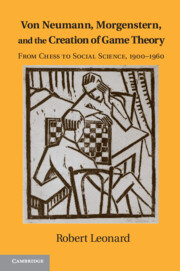Book contents
- Frontmatter
- Contents
- Acknowledgments
- Von Neumann, Morgenstern, and the Creation of Game Theory
- Introduction
- Part One Struggle and Equilibrium: from Lasker to von Neumann
- 1 “The Strangest States of Mind”
- 2 “Deeply Rooted, Yet Alien”
- 3 From Budapest to Göttingen
- 4 “The Futile Search for the Perfect Formula”
- Part Two Oskar Morgenstern and Interwar Vienna
- Part Three From War to Cold War
- Bibliography
- Index
- Plate section
2 - “Deeply Rooted, Yet Alien”
Hungarian Jews and Mathematicians
Published online by Cambridge University Press: 05 December 2013
- Frontmatter
- Contents
- Acknowledgments
- Von Neumann, Morgenstern, and the Creation of Game Theory
- Introduction
- Part One Struggle and Equilibrium: from Lasker to von Neumann
- 1 “The Strangest States of Mind”
- 2 “Deeply Rooted, Yet Alien”
- 3 From Budapest to Göttingen
- 4 “The Futile Search for the Perfect Formula”
- Part Two Oskar Morgenstern and Interwar Vienna
- Part Three From War to Cold War
- Bibliography
- Index
- Plate section
Summary
Of König, Kalmár, and von Neumann it may be said that they came from a world, now lost, composed of two social sets and their intersection: Hungary's mathematicians and its assimilated Jewry. Not all the former were of Jewish origin, of course, but, as in the chess world, a significant number of them were. If, over the next few pages, we examine this milieu, it is not only because it allows us to view the world in which the young von Neumann emerged, but also because it provides critical background against which we can understand later developments. Von Neumann's engagement with social science in the 1930s was bound up with the dissolution of the community described here.
Hungarian Jewry
A characteristic emphasised in many histories of the Jews of Hungary is the degree to which, beginning in the mid-ninteenth century, they achieved integration into Hungarian society. A Jewish community had been present in Hungary since the tenth century, its numbers growing at the end of the eleventh with the arrival of refugees escaping pogroms. The first Jewish law in the history of Hungary was passed when King Béla put the community under his protection, with taxes being paid to the court. The second half of the nineteenth century saw a large wave of refugees from further pogroms in Russia and the eastern part of the Monarchy, so that, between 1840 and 1890, the Jewish proportion of the Hungarian population rose from 2 percent to almost 5 percent. The emancipation of Hungary's Jews began in 1849, with the law passed that year forming the basis for a more substantial law in 1867. This was the year of the Ausgleich, or Compromise, when the Hapsburg Monarchy, in the face of nationalist pressure, granted greater autonomy to Hungary, marking the beginning of a flourishing period for the country. Law XVII of that year, on the “emancipation of the inhabitants of the Israelite faith of the country”, allowed Jews to hold various commercial licenses, practice certain professions, and enter parts of the public service.
- Type
- Chapter
- Information
- Von Neumann, Morgenstern, and the Creation of Game TheoryFrom Chess to Social Science, 1900–1960, pp. 30 - 41Publisher: Cambridge University PressPrint publication year: 2010

